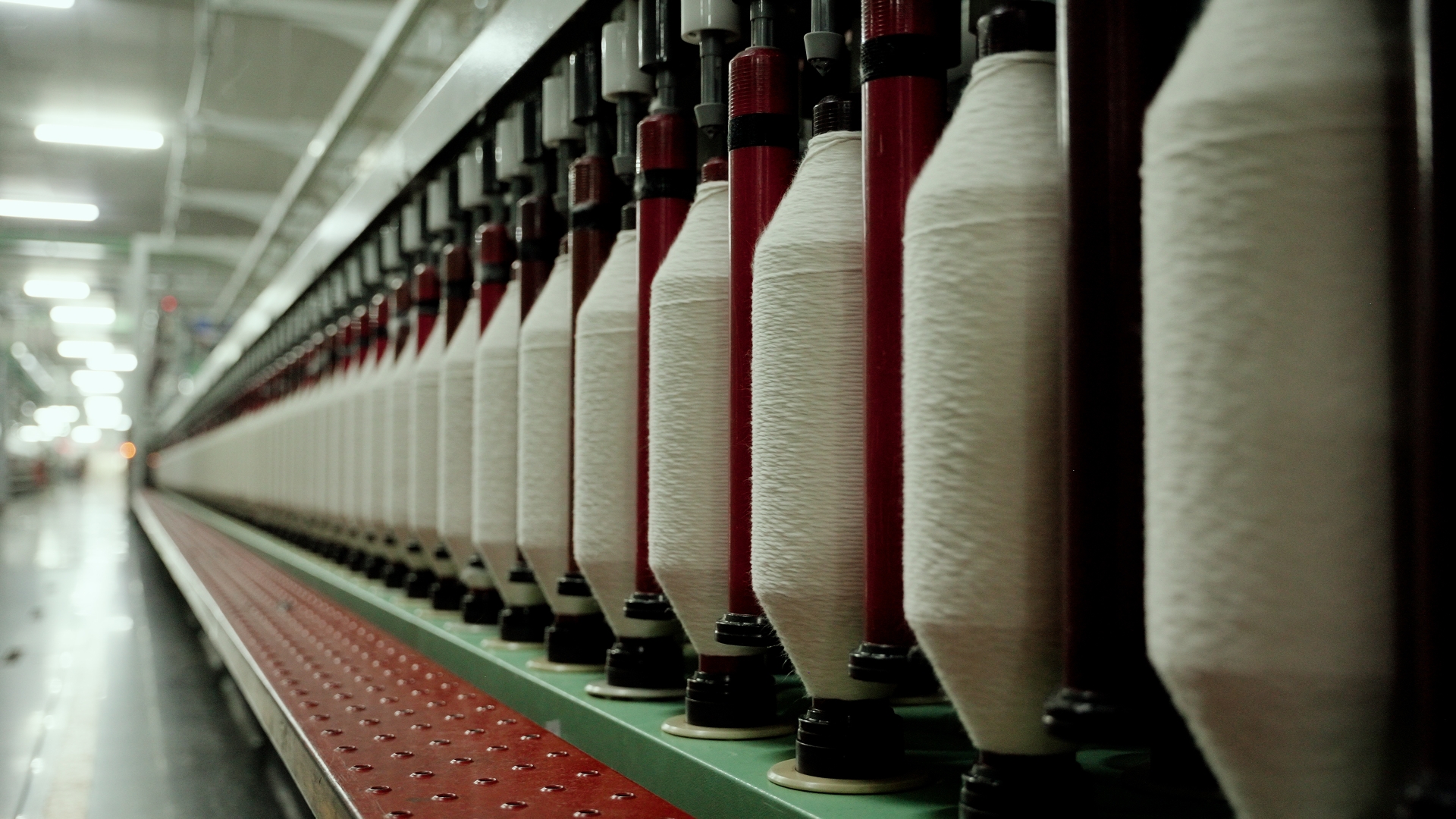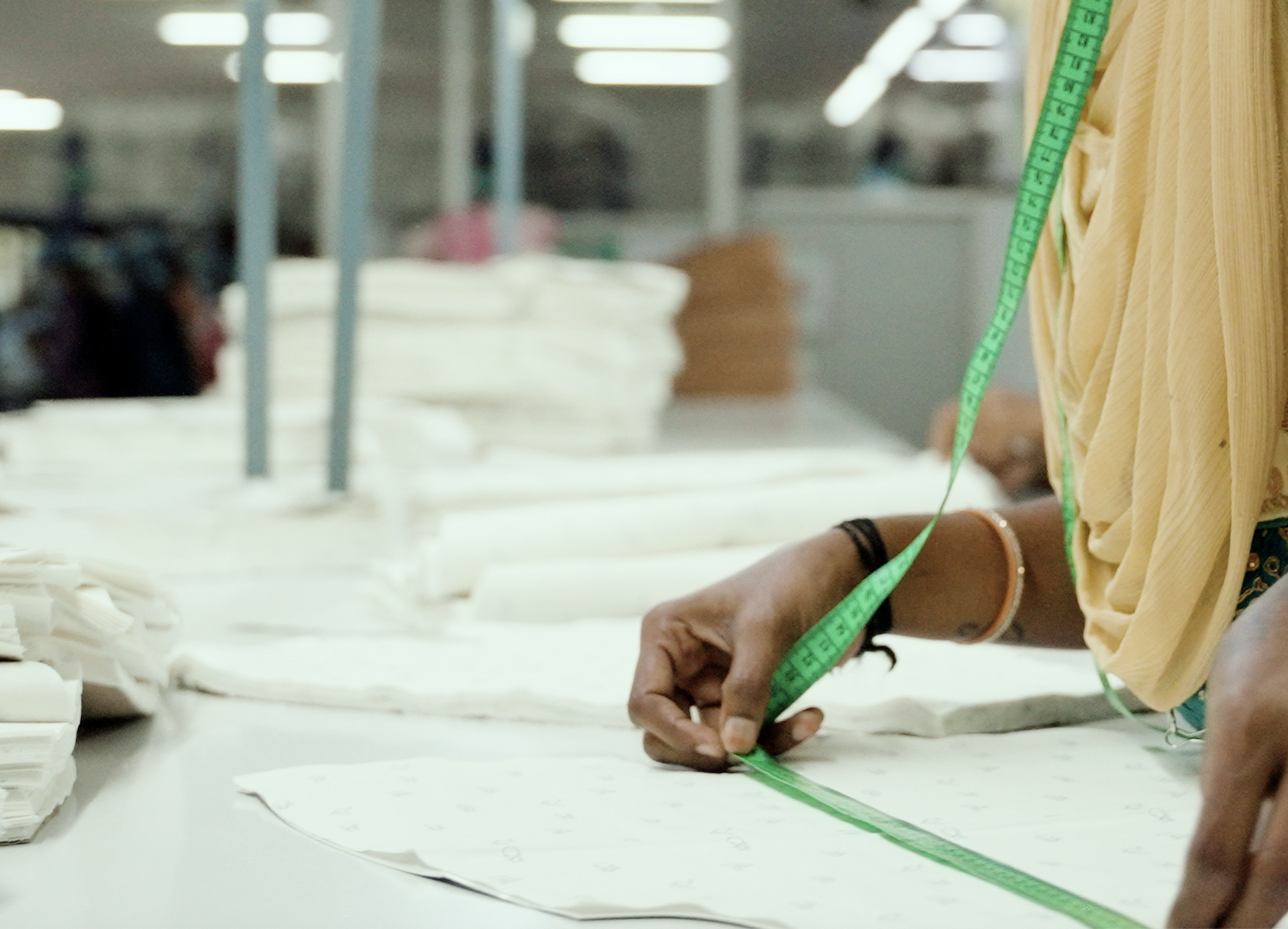Plan A - Our Planet
The impact of climate change affects all of us and the scientific evidence is clear – urgent action is needed by everyone. An important part of our strategy to reshape M&S for sustainable, profitable growth is our ambition to become a net zero business across our value chain by 2040.
To support our ambitions, we set reduction targets that align with climate science to limit global warming to 1.5°C and had these validated by the Science Based Target initiative (SBTi) in 2022. Subsequently, the SBTi released new guidance for businesses with FLAG emissions, which are emissions related to Forestry, Land and Agriculture. Non-FLAG emissions are emissions from energy and industry (E&I), which are all the other fossil-based emissions from a company. In 2025, in line with the new guidance, we reset our targets to include FLAG and non-FLAG and updated our Scope 3 base year from 2016/17 to 2022/23. These targets, which are aligned to climate science, have been validated by the SBTi.

To deliver against our targets we have 10 priority areas, underpinned by three enablers that support their delivery and progress against these. Progress updates are shared in our ESG report.
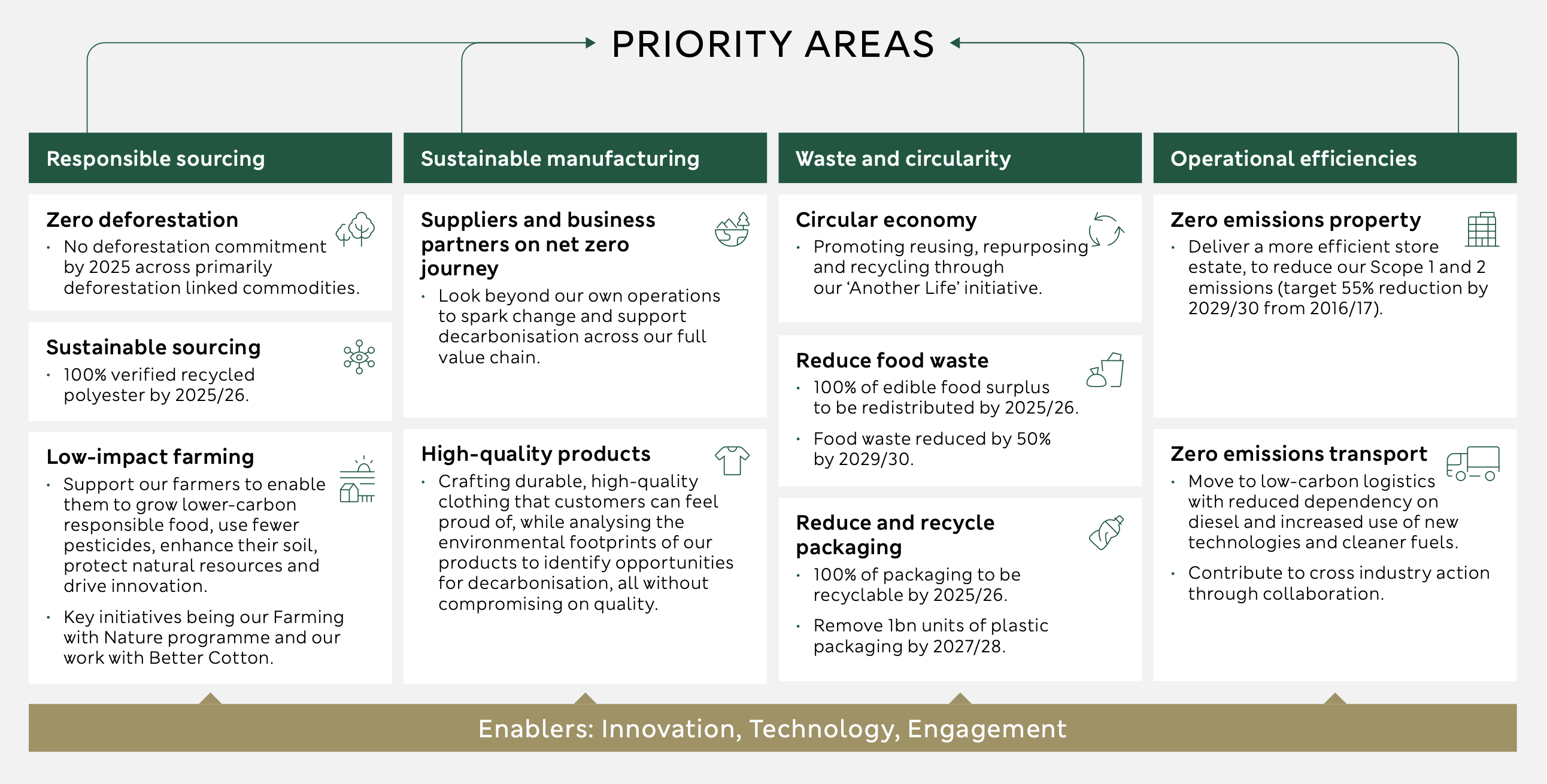
Our emissions
Scope 1 and 2 emissions make up 5% of our total emissions and come from the fuel, gas and electricity used in our stores and logistics operations. The majority of our carbon footprint is upstream and downstream of our direct operations, classified as Scope 3 greenhouse gas (GHG) emissions. These make up 95% of our total footprint, mainly from the products we purchase to sell through our Food and Fashion, Home & Beauty businesses.
Management is monitoring progress towards our carbon reduction targets via our ESG Business Forum on a quarterly basis. We have a clear line of sight, based on projects that are underway, to 86% of the emissions reduction we are committed to in order to achieve our 2029/30 targets.
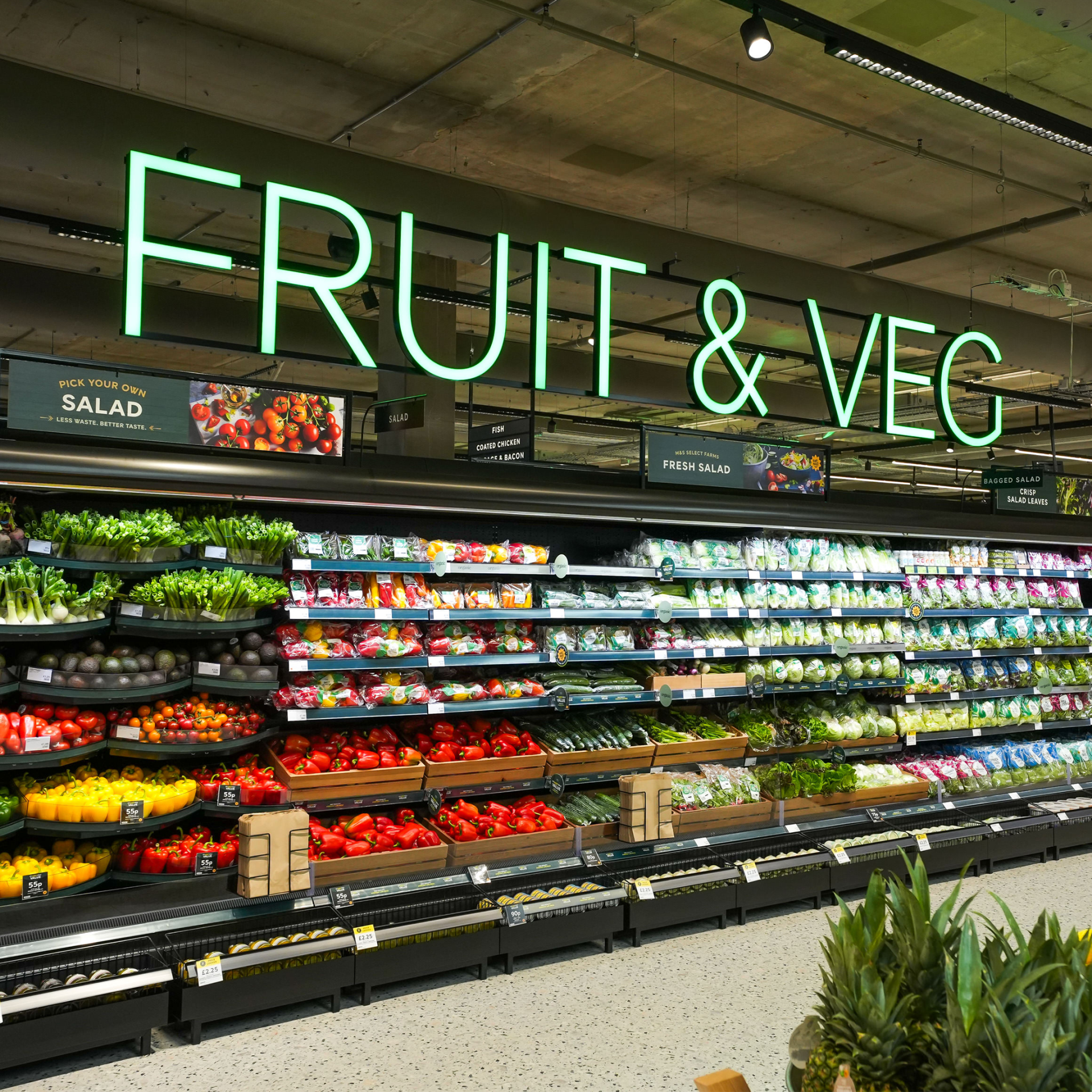
We continue to invest in our store estate, warehouses and logistics fleet to reduce our operational emissions.
In 2024/25, we have driven a 33% reduction of total Scope 1 and 2 location based greenhouse gas emissions, against 2016/17 base year and a 3% reduction of energy consumption, against 2023/24.
We have developed a standardised store specification to ensure a strategic estate-wide approach to lowering emissions, which include LED lighting, fully electric heating and fridge doors. To increase our use of renewable energy, we have selected two supplier partners to build rooftop solar generation capability under power purchase agreements (PPA), and plan to complete 16 sites (including four distribution centres) during 2025/26.
Across logistics, this year we have introduced 85 lower-emission vehicles into our logistics fleet which means almost 10% of our total transport fleet will be powered by lower-emission solutions.
At M&S every product is designed, made and sourced with care, and as an own-branded retailer significant part of our reduction in carbon emissions will come from working with our supplier partners. Highlights in 2024/25 of our progress include:
- 99% RSPO Certified Sustainable Palm Oil with segregated status
- 83% soy sourced from verified deforestation and conversion free supply chains
- 100% of cotton used in clothing from more responsible sources
- 91% polyester in from verified recycled sources
148.1m units of plastic removed from our own-brand packaging portfolio.
More information can be found in our ESG Report.

Working together
To make net zero a reality, working with our stakeholders will be crucial. This is why we have designed our roadmap towards net zero as a multi-stakeholder plan that includes customers, colleagues, supplier partners and industry partners to help deliver the emissions cuts needed across our whole value chain, from the raw materials we use to how our customers use our products.
We know we can’t achieve our pathway to net zero if we don’t work with our customers to help them live lower-carbon lives. We also know from our M&S Family Matters Index report that the environment and climate are issues that matter to our customers.
We’re inviting our customers to Look Behind the Label and discover the sustainability stories behind our products. In our new Look Behind the Label hub customers can dig a bit deeper to discover the steps we’re taking to protect the environment when sourcing some of their favourite products. In 2022, we launched Sparking Change, run in partnership with behaviour change experts Hubbub to help our Sparks customers prepare more sustainable meals from scratch.
We’ve worked with Reboot the Future, a not-for-profit organisation that works with young people and business leaders, to create resources that encourage customers to start conversations about climate change and to make it easier for them to discuss the challenges and opportunities of living lower-carbon lives.
Reducing our carbon emissions is not something we can do alone. The achievements of Plan A to date are thanks to the efforts of our colleagues, who we know are passionate about building a sustainable future. We’ve started by improving carbon literacy across our business, giving colleagues a greater understanding of the emissions associated with how we source, make and move our products.
Through our partnership with WWF, we’ve been inviting colleagues to assess their personal environmental footprint using WWF’s environmental footprint calculator. So far, around 1,000 colleagues have used the online tool to understand their environmental impact and view actions they can take to reduce it.
We’ve identified 100 colleagues as 'Carbon Champions'. They work in key roles such as buying, sourcing and logistics and will help activate our net zero transformation across different areas of our business. By building knowledge across these teams, we can take action quickly to reduce emissions. We have also established a Plan A Network, giving our colleagues space for discussion, engagement and learning on climate change. The network now has over 1,800 members from across stores, support centres and distribution centres.
In Fashion, Home & Beauty we have a Sustainability Academy to support our product development colleagues and teach them about sustainability topics, such as circular fashion, animal welfare and sustainable sourcing.
No one business can solve all the sustainability challenges that lie ahead, which is why we work with trusted supplier partners and organisations in the industry to help us innovate and adapt to our changing environment.
As a starting point, we’ve asked all of our Food suppliers to commit to our ‘six key asks’. These include setting a science-based, 2040 net zero target and roadmap for Scope 1, 2 and 3 emissions; purchasing 100% renewable electricity; purchasing verified deforestation- and conversion-free animal feed; focusing on packaging quality, innovation and sustainability, and removing plastic where possible; and implementing a food waste redistribution plan.
In our Fashion, Home & Beauty supply chain we’re supporting our tier 1 and tier 2 suppliers to reduce their carbon emissions. We use the Higg Index Facility Environmental Module (FEM) as a standard measurement of supply chain sustainability which helps us track improvements in our supply chain environmental performance. We use data from the Higg FEM to help develop our supply chain programmes within our clothing categories and to support supplier partners to reduce the greenhouse gas (GHG) emissions of their facilities. It also helps us to understand complex environmental metrics such as chemical management, air emissions and wastewater.
Our collaboration with key partners across the retail industry includes working with Better Cotton, the British Retail Consortium, Canopy, Cascale, LEAF, Leather Working Group, Textile 2030, WRAP and WWF.
We are also a member of the Science Based Targets initiative’s Business Ambition for 1.5°C, the UN’s Race to Zero campaign and the British Retail Consortium’s Climate Roadmap.
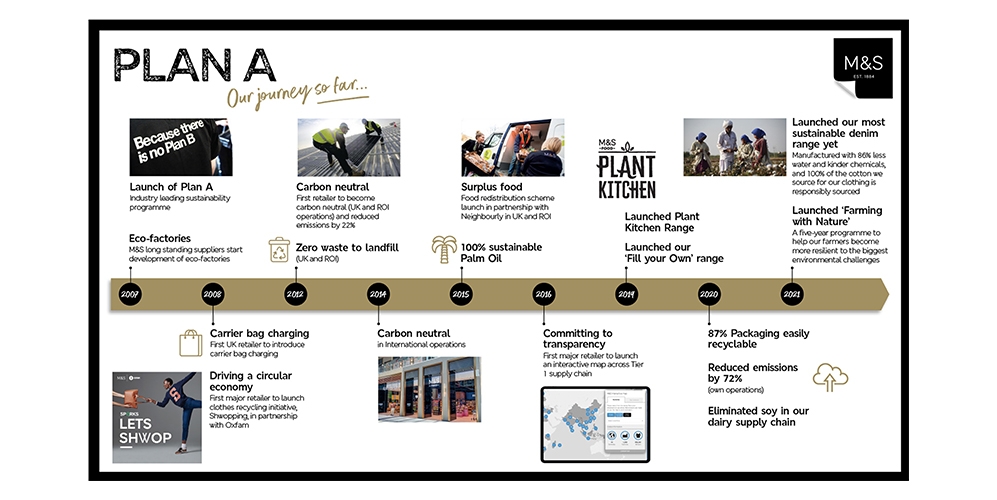
Our journey so far
Since 2022, we have used our 'Plan A Accelerator Fund' to fund or co-fund projects that address challenges and support innovation to reduce emissions and identify the programmes we can scale with our partners. In 2024/25 the fund was used for 10 projects across Food, Fashion, Home & Beauty and Property. Projects included: reducing the farming emissions from tractors through automation of parsnip production with Huntapac; helping extend the life of clothes with the launch of our online repair service with SOJO; and the installation of an air source heat pump. More information can be found in our ESG Report.
In December 2021, we agreed a new £850m revolving credit facility, directly linked to the delivery of net zero targets. Under the terms of our new facility, which will run to June 2026, we will benefit from a lower interest rate for delivery against four metrics that deliberately focus on material emissions hotspots aligning to our roadmap towards net zero and to areas of customer concern.
A summary of our metrics can be found below.
- 100% of polyester sourced from verified recycled sources by 2025/26
- 100% physically certified deforestation- and conversion-free soy by 2025/26
- Scope 1 and 2 emissions reductions in UK and ROI property (annual reduction/tonnes CO2e)
- Removal of plastic packaging units per year from the company’s packaging portfolio
The related assurance opinion will be published in supplementary sustainability reporting later this year.


